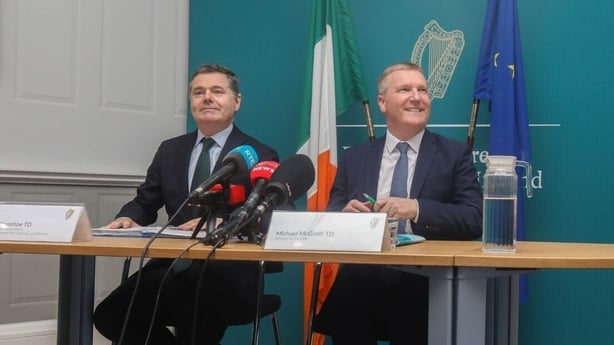The Government has revised down slightly its projections for growth in the domestic economy this year, but still expects a moderate level of expansion in 2024 and beyond.
Publishing the Stability Programme Update (SPU), it says it now expects the key measure of domestic economic growth, Modified Domestic Demand, to expand by 1.9% this year, down from the 2.2% it estimated at the time of the Budget.
But it also expects the rate of domestic growth to pick up pace to 2.3% in 2025.
The speed at which consumer prices are rising is also now expected to fall more sharply than thought in October.
Inflation is now predicted to average out at 2.1% this year, rather than the 2.9% previously forecast, as global energy prices continue to drop.
This is expected to lead to a pick-up in consumer spending as increases in wages translate to stronger purchasing power.
A strong labour market and ongoing full employment means the unemployment rate is expected to average just over 4.5% this year and in 2025, a little higher than previous estimates, the SPU says.
“Available evidence suggests the economy is in reasonable shape, at least in aggregate terms,” the Minister for Finance Michael McGrath said.
“Looking ahead, some of the headwinds that have dominated over the past year are set to ease as the year progresses and this should support a pick-up in economic activity,” Mr McGrath said.
The all-round solid economic performance means the Government now expects to record a surplus this year of €8.6 billion, up slightly on the Budget day forecast.
This is based on tax revenue growing by 4.6% to €92.1 billion.

But the Department of Finance is cautioning that once corporation tax receipts of around €11 billion that are considered to be one-off in nature are excluded, that surplus would turn into a deficit.
Such “windfall” receipts have risen from €4 billion to €24 billion over the last ten years.
“These receipts cannot be relied upon: we saw a marked slowdown in corporation tax over the course of last year, highlighting the volatility of this revenue stream,” Minister McGrath said.
“We can say with reasonable confidence at this point that the era of corporation tax over-performance is coming to an end,” he added.
Following several years of it being breached, the SPU also sets out a return to the Government’s spending rule, which limits the growth in core spending each year to 5%.
However, the SPU still contains a non-core spending allocation of around €4.5 billion for each year from 2025 to 2027.
That is similar to this year’s figure and is included primarily to meet the challenges arising from Covid and the war in Ukraine, with the bulk of the spend driven by the humanitarian response to support people fleeing the war.
This year spending of €97.1 billion has been budgeted for, but by 2027 annual spending is expected to have reached over €110 billion.
“This increased investment will help us to improve living standards, supporting economic growth and help us tackle the challenges of climate change and the green transition,” the Minister for Public Expenditure, National Development Plan Delivery and Reform Paschal Donohoe said.
“The continued capital investment through the recently reviewed National Development Plan will make a difference to our lives, particularly in areas like housing,” Mr Donohoe said.
The further growth in the economy means the debt to GNI* ratio should fall to 72.1% this year and 69.7% in 2024, the SPU says.
However, the overall level of debt will remain high at more than €223 billion.
EU member states legally must publish an SPU by the end of April each year and submit it to the European Council and Commission as part of budgetary planning.
The publication marks the formal start of the annual budgetary process, ahead of the publication of the Budget in October.
Source link
 TG4 TV PC to TV
TG4 TV PC to TV
